The NewCanaanite.com Summer Internship Program is sponsored by Carriage Barn Arts Center.
In an effort to provide a pesticide-free solution to a growing number of invasive plants, the New Canaan Nature Center on Thursday introduced four goats into one of its pastures.
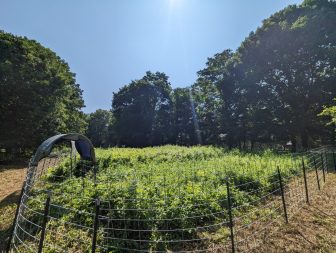
The goats’ pasture at the New Canaan Nature Center. Credit: Connor Markey
The introduction of the goats is the Nature Center’s first such project “of what we hope is many,” according to Bill Flynn, the organization’s executive director.
“Because of our land management plan, we chose not to use chemicals to tackle invasive species, and goats are a non-chemical way to do that,” Flynn said as he stood near a half-acre field in the northern section of the Nature Center.
About 20 volunteers had prepared the pasture the day before by installing fencing and a shelter for the animals.
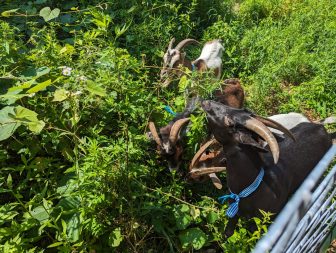
The goats at the New Canaan Nature Center. Credit: Connor Markey
The area is “full of” invasive vines, Flynn said.
“Bittersweet, we have a huge mugwort problem on our property,” he said. “There’s garlic mustard. There’s all kinds all over the property.”
Visitors to New Canaan’s Irwin Park may remember the goats introduced there for a similar purpose four years ago. That plan was spearheaded by Alice Wyman and Wendy Dewey of the New Canaan Garden Club, who are now helping the Nature Center accomplish the same thing.
According to Flynn, additional benefits of using goats is that they’re “not selective” and they eradicate the problem effectively.
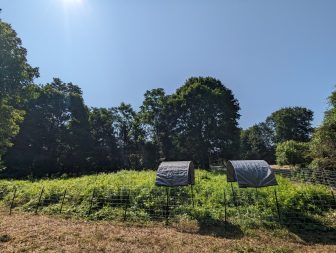
The goats’ area the New Canaan Nature Center. Credit: Connor Markey
“They’ll eat all of it, but the way they chew the plants, they don’t regrow as well as if you cut them,” he said.
The long-term plan is to have the goats drastically cut down the number of invasives in the pasture, leaving room for the Nature Center to plant more desirable plants.
“They don’t grow back as much, and then you can plant in the good stuff that you want, that’s the idea,” Flynn said.
Tom Turrentine, one of the main advocates for the introduction of the goats, described the process behind constructing the pasture.
“They’re going to feed themselves on what you’re looking at out there, and then these two are shelters for pouring rain, they can come in here if they want,” he said, motioning toward two shelters at one end of the pasture. “For the sun there’s a tree line over there that this goes under, so that’s shade all day.”
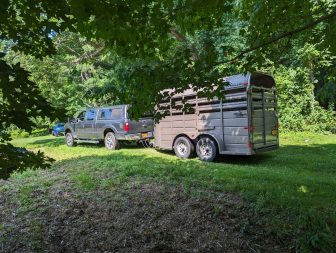
The goats arrive at the New Canaan Nature Center. Credit: Connor Markey
While there is no natural water source near the goats pasture, nature center staff stated that they would bring buckets over daily using a golf cart.
Wyman said one major goal is “to try and educate ourselves and others about potential alternatives to Round Up, and toxic herbicides/chemicals that are being used way too frequently for people’s health.”
“It’s not the cheapest way to go, but it’s really compelling for people during the summer to come learn about the invasives that are the problem,” she said.
Several families, in addition to a large group of around 50 preschoolers, stopped by to welcome the goats.
“It’s kind of a magnet for people to come visit,” Wyman said.
While this is the first time that goats have been used to help curb the spread of invasive plants on a Nature Center property, Wyman said she hopes that it won’t be the last.
“We are really hoping to get town approval to fence in the phragmites area, which is partial wetlands, and because goats love phragmites,” she said. “That’s an area that is really tricky to get machinery in, and certainly you don’t want to use chemicals, because it’s surrounded by water—the Nature Center is committed to a totally chemical free landscape program.”
Wyman has been working alongside Ann Cihanek, who runs Green Goats Rhinebeck, based in Rhinebeck, N.Y., the company that leases out the goats.
“My husband and I started Green Goats in 2006,” Cihanek said. “We were called by a park in Staten Island, they had lots of poison ivy, and the workers couldnt access the area.”
Staten Island park officials had contacted around 400 different goat owners to see if they would be willing to help with the problem, but Cihanek and her husband were the only ones to respond to the call.
“We just had two goats that our kids had, their names were Curry and Stew,” Cihanek said, describing how her business began. “They were the first employees of Green Goats.”
Cihanek has since expanded her business across state lines, with this summer being one of her most successful to date.
“We were lucky this season, we have lots of projects going,” she said. “Lots of local parks, state parks, golf courses, cemeteries, that sort of thing.”
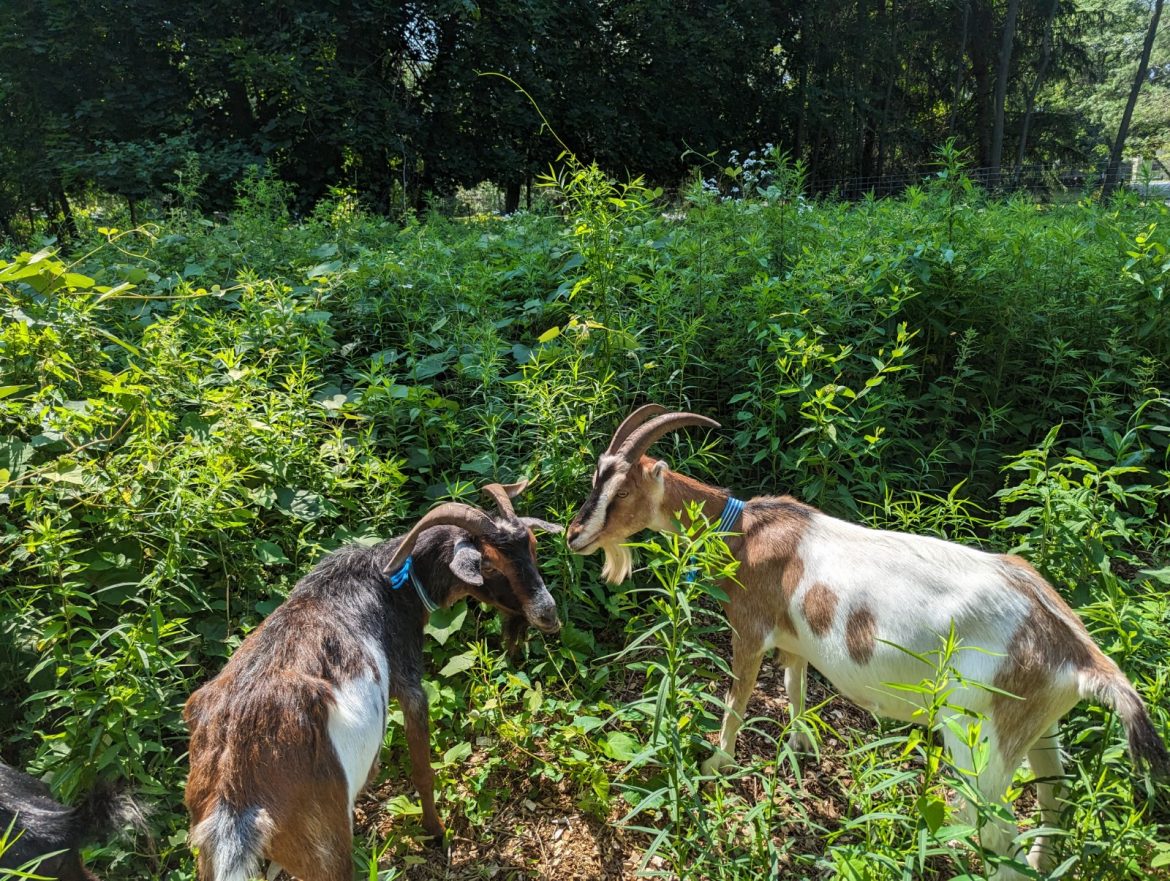
I would love to borrow the goats for my property, but I think the coyotes would attack them.
Good luck with these goats and thank you for sharing this wonderful story.